- Home
- Peter Ackroyd
The Death of King Arthur Page 2
The Death of King Arthur Read online
Page 2
‘We should take our horses,’ Igraine told him, ‘and ride out of here as soon as we can. I would be willing to ride all night.’ Even though night is an evil time they fled, turning their faces towards Tintagel. As soon as Pendragon knew of their departure he grew very angry. And, as the people of England knew well enough, the wrath of the king is death. He called together his council of nobles, and explained to them that he had been dishonoured by ‘that little duke who rules the little people of Cornwall’.
One of his council suggested to him that he should call back the duke and his wife, under pain of his severe displeasure. Yet the duke’s answer to the summons was swift. He would never allow his wife into the presence of the tyrant. Pendragon then grew more violent still. He sent him a sword that had been bent in the middle, as a sign of contempt. ‘Prepare yourself for war,’ he wrote. ‘Summon your servants. Protect your castles. Uther Pendragon is coming to destroy you. I will grind you to dust. I will split your wife with my spear.’
Once the duke had received the broken sword and the letter, he wasted no time in calling for arms and reinforcements. He left his wife in the Castle of Tintagel, where the rocks and the waves might protect her, while he rode out to command the castle known as Terrible. It was truly mighty to behold, made of black granite and black marble, filled with many cunning passageways and secret doors where death and treachery were waiting for the unwary.
Pendragon marched out from his palace at Winchester and, with his great army, advanced into Cornwall. It was a desolate region, largely unknown to the rest of the country, where witches and warlocks were reported to have the mastery. Eventually he came to Castle Terrible, situated beside the confluence of two rivers, and proceeded to lay siege to it for fifty days and fifty nights. Much blood was shed, and many brave men lost their lives, in the skirmishes and sallies that sustained the siege.
But then Pendragon grew sick. His face was pale, and his eyes large. He could hardly draw breath, his heart was so weak. One of his lords, Ulfius, approached him as he lay sighing upon a bed of silk wrought with jewels in the form of stars. ‘Ah, king,’ he whispered, ‘you are suffering from some great distemper. Do you know anything that might have caused it?’
‘The two greatest enemies of man, wrath and love, are now fighting over me. My wrath for the Duke of Cornwall consumes me. My love for his wife, Igraine, is destroying me. Where can I turn? To whom should I pray? I know that I will die far from my family in this bitter land of Cornwall.’
‘There is one person who can save you, sire.’
‘Who is that?’
‘Merlin. The great magician. He is the man who made the abbey church of Derby disappear into the earth. He will know how to heal you. He will find a cure.’
‘Bring him before me. Let him work his magic on my poor bones.’
So Ulfius rode out, whispering the name of ‘Merlin’ under his breath many times; he knew that the magician was aware of the secret life of all things, and would know that his name was being murmured in the wind. The birds, or the singing grasses, would tell him. As Ulfius rode on he suddenly encountered a beggar standing in the high road; the beggar wore a hood, and his back was turned to the knight. He seemed to be peering at something lying on the ground. ‘Move,’ Ulfius told him. ‘Get out of my way.’
‘Do you begrudge a poor man the space of a dusty road?’ the beggar replied.
‘Move on, or I will cut you with my sword. It is not right for a knight to argue with one such as you.’
‘Even if I know for whom you seek? Even if I know that your name is Ulfius?’
‘Who are you?’
‘I am the one you wish for. I am Merlin.’ He put out his hands, palms outward, and his beggar’s clothes were transformed into robes of white satin. ‘I am the man of magic.’
‘Well met then.’
‘Tell Uther Pendragon that I will cure him of his sickness. There is one condition. He must grant me whatever I wish, without reluctance or hesitation. If he agrees, then I will fulfil all of his desires.’
‘I will tell him this as soon as I return to him. I am sure that he will keep any promise he makes to you.’
‘Good. The king will gain the object of his desire. I guarantee that. Now ride back to him. I will not be far behind you. I will never be far away.’
In good spirits Ulfius galloped off and made his way to the king’s pavilion, which had been erected in the field in front of Castle Terrible. He walked in and made reverence to Pendragon, who was still lying in his bed sick at heart. ‘I have found Merlin, lord king.’
‘Where is he?’
‘He said that he will not be long, sir.’
Here we will tell of the birth of King Arthur
There was a sound as of bird wings beating, and at that moment Merlin appeared at the entrance of the pavilion. Suddenly the magus was standing at the king’s bedside. ‘Sir,’ Merlin said, ‘I know what is in your heart. I know your secrets. If you will swear to me on the honour of a true and anointed king that you will fulfil my desire, then you will have your wish.’
‘Bring me the Holy Book,’ Pendragon asked a courtier. Then he swore his oath upon it.
‘This is my desire,’ Merlin said. ‘On the first night that you lie beside Igraine, you will conceive a child. I wish that child to be delivered to me the next day. I will raise it so that it will bring great worship and renown to you.’
‘I swear to do this,’ the king replied. ‘The child is yours.’
‘Then prepare yourself, sir king. This night you will lie with Igraine in the Castle of Tintagel. You will appear there in the shape of her husband, the duke; Sir Ulfius here will be changed into Sir Brastias, a knight of the duke’s retinue, and I will become Sir Jordanus. Do not speak much to her but say you are sick. Then take her to bed. Do not stir from her side until I come to you on the following morning. Let us go now. We will ride out. Tintagel is only ten miles off.’ So the three of them mounted their horses and rode away.
The Duke of Cornwall, standing on the battlements, had seen them leaving; he had no idea where they were going, but he decided to take advantage of the king’s absence. He issued with his warriors from the postern gate of the castle and attacked the besieging army. In the ensuing struggle he was slain. He was brought down by an arrow in his left eye, like a later king. He fell dead to the ground even before Pendragon had reached the Castle of Tintagel.
The scheme devised by Merlin worked. Uther Pendragon, in the shape of the Duke of Cornwall, lay that night with Igraine; three hours after the death of the duke, Pendragon begat upon her the babe that became known as Arthur. At the break of day Merlin came to the bedside and advised the king to depart; so the king kissed Igraine, and took his leave of her. When she learned later that her husband had died in battle, hours before the arrival of the one who had assumed his form, she wondered who had lain beside her in the likeness of her lord. But she mourned in private, and kept silent. She was discreet.
The barons of the kingdom now agreed one with another that the king should reach an accord with the noble lady Igraine. Sir Ulfius was chosen to make a treaty between them. ‘This is a pact that will please all of us,’ Ulfius said. ‘She is a fair lady and our king is a fine warrior. Happiness and prosperity will spring from the union between them.’
So they approached their sovereign with the plan, and of course he gave his assent at once. Secretly he was delighted. On a bright morning later that month, Uther Pendragon and Igraine were married with much mirth and rejoicing. They were conveyed in a chariot to the great stone circle on the plain of Salisbury, where the kings of England were always wed, and the people gathered around them with sprigs of laurel newly cut.
At the same time the king ordained that the new queen’s daughters should also be wed. King Lot of Lowthean and Orkney married Morgause, and from their union came Gawain. King Nentres of the land of Garlot wed Elaine. Igraine’s third daughter, Morgan le Fay, was put into a nunnery where she learned the mysteries of t
he magic stone as well as other secret arts. In later years Morgan le Fay was married to King Uriens of the land of Gore; they bore a son who became known as Sir Uwain of the White Hands. Much trouble was being stored for the future of the kingdom.
Day by day Igraine grew greater with child. Uther lay with her one night and asked her, on the faith she owed to him, whose offspring it was. She was too ashamed to answer. ‘Do not be dismayed,’ he told her. ‘Tell me the truth. I shall love you all the more for your honesty.’
‘I will speak the truth to you, my lord. On the night that my husband died a stranger came to Tintagel in his shape; he had the same speech, and the same countenance, as the duke. There were two companions with him, whom I thought to be Sir Brastias and Sir Jordanus. So I was deceived. I did my duty, and lay beside him in our bed. I swear to God that, on the same night, this child was conceived.’
‘I know, sweet wife, that you are speaking the truth. It was I who came to the castle. I entered your bed. I am the father of this child.’ Then he told her of the magic of Merlin, and she marvelled at it. But she was overjoyed, too, that Uther Pendragon was the sire of her offspring.
Merlin came to the king a little while later. ‘Sire,’ he said, ‘you must keep your promise. You must hand the child to me.’
‘If that is your wish, then so be it.’
‘I know a lord in your land who is true and faithful. His name is Sir Hector, and he holds territories in England and in Wales. I have chosen him to take care of your child. He will guard it well. Send for this lord, sir, and ask him to bring up your child in love and honour; let his wife nourish your baby as her own. When the child is born, bring it to me unbaptized at the postern gate here.’
All was done as Merlin had ordained. Sir Hector came to court and, having pledged faith to the king, consented to raise Uther Pendragon’s child as his own. The king rewarded him with many gifts. When Igraine was delivered of her baby it was wrapped in cloth of gold; the king then ordered two lords and two ladies to take it to ‘whatever poor man you find at the postern gate of the castle. Ask no questions of him.’ So the child was carried to Merlin, who with his finger traced the secret sign on the baby’s forehead. Then he took the boy to Sir Hector’s castle, where he was baptized by a priest and given the name of Arthur. And Arthur was nourished by Hector’s wife.
Here we will tell of the sword in the stone
Two years later, Uther Pendragon suffered a severe illness. Even as he lay upon his sickbed, sighing, his enemies attacked his kingdom and devastated his armies. ‘Sir king,’ Merlin said to him, ‘you must not lie here. You must advance into battle, even if you are carried in a litter. The king is the strength of the land. You will never get the better of your enemies unless you go against them in person. Only then will you gain the victory.’
‘I will do as you wish,’ the king replied. ‘I know that your spells will surround me.’
The king’s men carried him in a litter, at the head of a great host, and at Saint Alban’s he won a great victory over his enemies from the North. His armies slew many people, and put the rest to flight. Uther Pendragon returned to Winchester in triumph, the banners of battle raised high.
But the sickness of the king returned, worse than before, and he lay for three days and three nights without speaking. The barons of the realm were greatly alarmed, and asked Merlin for his advice. ‘There is no remedy,’ the magician said, ‘God’s will be done. But I tell you this. Assemble before the king tomorrow. I will make sure that he speaks to you.’
So the barons came together on the following morning, in the presence of their king, and Merlin spoke aloud to Uther Pendragon. ‘Sir,’ he said to him, ‘is it your will that your son, Arthur, be anointed as king after your death?’
The king turned to him and, in hearing of them all, responded, ‘I give him the blessing of Almighty God, and I grant him mine. May he be crowned king in my place, and I entreat him to pray for my soul when I have been laid to rest.’ And, with those words, he died. He was buried soon after, with all the ceremony of state, within the great circle of stone. One thousand men and one thousand women grieved aloud, sending many shrieks and laments into the sky; beacons were lit throughout the land, to mark his passing.
There then followed a period of disturbance and danger. There were many lords in this land who longed to be king, and who were prepared to do battle for the crown of England. So Merlin visited the Archbishop of Canterbury. ‘Call together all the nobles and knights of the realm to London, reverend sir,’ he said to him. ‘Tell them to assemble in the city by Christmas Day, on pain of excommunication. They will witness a miracle, I assure you of that. The king of the universe will on that day declare who is to be king of the realm.’ So the archbishop sent his summons, and the magnates set out for the city in the hope that they might see their new sovereign. They prayed and confessed themselves on their journey, so that they might be all the more pure.
In the great church of London – whether it was the Abbey or Saint Paul’s, I do not know – all the estates of the realm were gathered on Christmas Day. They assembled here before dawn, and heard matins as well as the first mass. When they walked out into the churchyard, however, they witnessed a wonder. There was a sound as of thunder and a great slab of stone, some four feet square, hovered above their heads before landing against the wall of the church; it was made of marble and, in the middle of it, was a steel anvil which held a sword. There were letters written upon the side of the sword, stating that WHOEVER PULLS OUT THIS SWORD FROM THE STONE AND ANVIL WILL RIGHTLY BE KING OF ALL ENGLAND. There was much astonishment, and the excited noise of the crowd could be heard inside the church.
The archbishop came outside to find the cause of the commotion. When he saw the sword and the stone, he bowed his head and whispered some words. ‘I command you all,’ he said, ‘to return to the church and pray. No man may touch this sword until the end of the high mass.’
When the service was over, the great ones of the land hurried into the churchyard. They saw the stone, and the writing inscribed upon it. Those who wished to be king tried to lift the sword from the anvil, but they could by no means move it.
‘The man is not here who can lift the sword,’ the archbishop said. ‘Yet it is my belief that God will make him known to us. In the meantime let ten knights guard the stone. Then send out a proclamation that all who seek to rule this realm should travel to this place and try their fortune.’
Here we will tell of Arthur and the stone
On New Year’s Day a great joust was held on the smooth plain of Smithfield, just outside of the walls of the city. It so happened that Sir Hector and his son, Sir Kay, came forth to take part in the tournament; with them, too, was Arthur, who had become Hector’s adopted child. As they rode towards Smithfield, Kay realized that he had left his sword at his father’s lodgings. So he asked Arthur to ride back and retrieve it for him.
‘Of course, brother. I will be back in a moment.’ When he arrived at the house he found that all the servants had gone to the joust, and that the doors were locked. In great annoyance he said to himself, ‘I will ride into the churchyard, and take the sword that is sticking in the stone. My brother must not be without his weapon on this day.’ He came into the churchyard, tied his horse to the stile, and walked into the tent where the ten knights were supposed to watch over the stone. But they, too, had gone to the joust.
So he went over to the stone and, taking the hilt with both hands, lightly and easily took out the sword. Then he galloped back to Smithfield and gave the sword to Sir Kay.
As soon as Sir Kay saw it, he knew what it was and from where it had come. So he rode over to Sir Hector. ‘Father,’ he said, ‘I have here the sacred sword. I am meant to be sovereign.’
Hector looked at the sword, and then at his son. ‘Come with me,’ he told him. With Arthur beside them they rode back to the church and Hector, taking his son up to the altar, made him swear on oath where he had obtained the sword.
&nb
sp; ‘Sir,’ Kay said, ‘Arthur gave it to me.’
Hector turned to Arthur. ‘Where did you get this sword?’
‘I will tell you, sir. I went back to our lodgings to find Sir Kay’s sword, but there was no one there. So I came to the churchyard here, and pulled the sword from the stone. It was easy.’
‘There were no knights here?’
‘None.’
‘Arthur,’ Hector said, ‘I understand now that you must become king of this land.’
‘Me? Why?’
‘It has been ordained by God that the one who takes up this sword will reign over us. Let me see whether you can replace the sword and then remove it again.’
‘That will not be hard.’
So Arthur put the sword back in the stone. Then Sir Hector tried to take out the weapon, but it would not be moved. Sir Kay tried, too, but the sword could not be dislodged from the stone. ‘Now you try,’ Hector said to Arthur.
Arthur stepped forward and with the greatest ease withdrew the sword. At once Sir Hector and Sir Kay kneeled down before him. ‘What is the matter?’ he asked them. ‘Why are you kneeling before me? You are my father and brother.’
‘My lord Arthur,’ Sir Hector replied, ‘it is not so. I never was your father. I am not of your blood. But I did not know till now the height of your lineage.’ Then he told Arthur the story of Merlin’s commission to him. The young man wept when he understood that he was not Hector’s real son.
‘Sir,’ Hector said to him, ‘will you be my good and gracious lord when you become king?’
‘Of course. Otherwise I would be greatly to blame. You are the man in the world to whom I owe the most. Your wife – my good mother, or so I thought – has nourished me and kept me from my earliest days. If it is true that I am destined to be king, as you say, then you may ask of me anything you wish. I will not fail you, so help me God.’

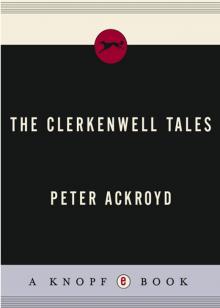 The Clerkenwell Tales
The Clerkenwell Tales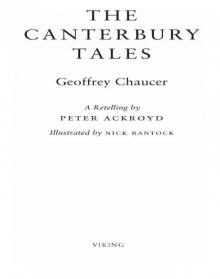 The Canterbury Tales
The Canterbury Tales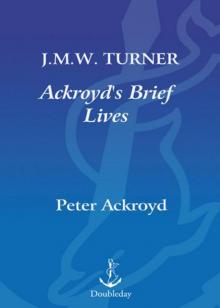 J. M. W. Turner
J. M. W. Turner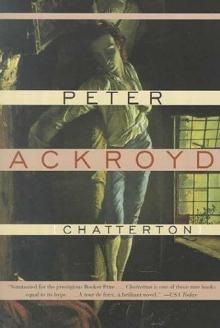 Chatterton
Chatterton The Canterbury Tales – A Retelling
The Canterbury Tales – A Retelling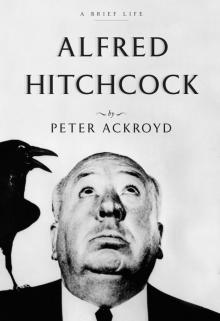 Alfred Hitchcock
Alfred Hitchcock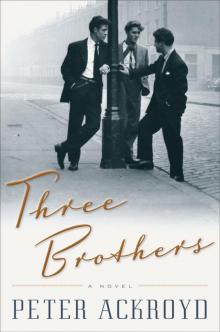 Three Brothers
Three Brothers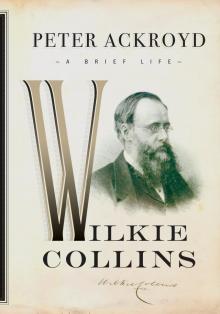 Wilkie Collins
Wilkie Collins Venice
Venice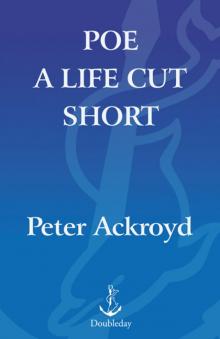 Poe
Poe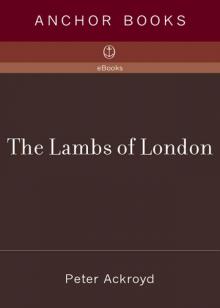 The Lambs of London
The Lambs of London London
London Queer City
Queer City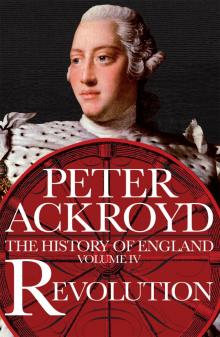 Revolution, a History of England, Volume 4
Revolution, a History of England, Volume 4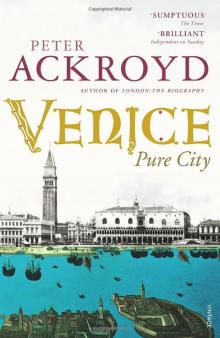 Venice: Pure City
Venice: Pure City Foundation
Foundation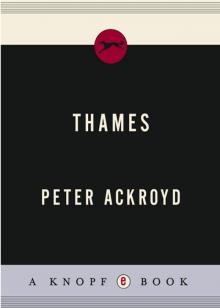 Thames
Thames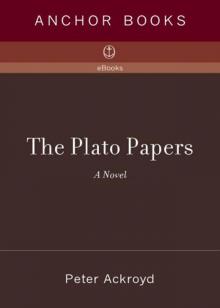 The Plato Papers
The Plato Papers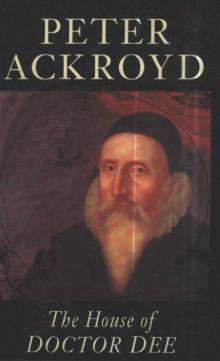 The house of Doctor Dee
The house of Doctor Dee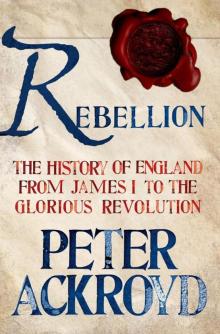 Rebellion: The History of England from James I to the Glorious Revolution
Rebellion: The History of England from James I to the Glorious Revolution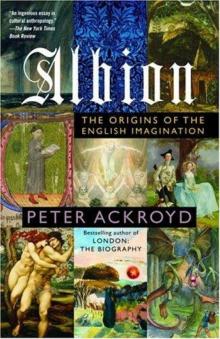 Albion: The Origins of the English Imagination
Albion: The Origins of the English Imagination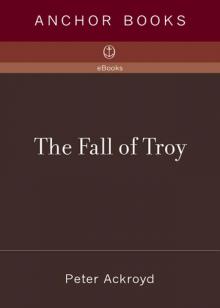 The Fall of Troy
The Fall of Troy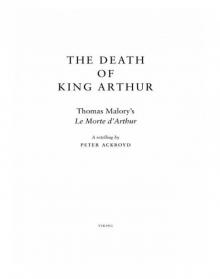 The Death of King Arthur
The Death of King Arthur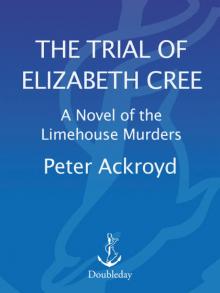 The Trial of Elizabeth Cree
The Trial of Elizabeth Cree London: The Biography
London: The Biography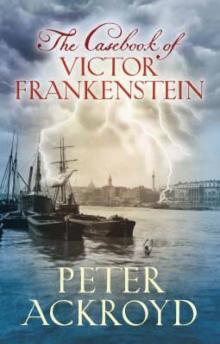 The Casebook of Victor Frankenstein
The Casebook of Victor Frankenstein Hawksmoor
Hawksmoor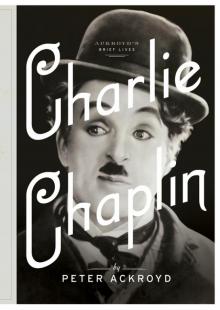 Charlie Chaplin
Charlie Chaplin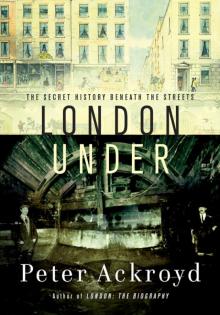 London Under
London Under